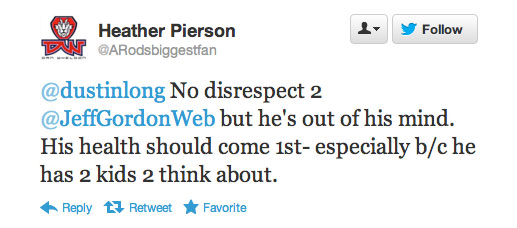Would Junior have seen a doctor if he was higher in points standings?
Then, an athlete is no longer a uniform but a person. It's easier to root for the uniform without knowing the person.
So it was that Jeff Gordon honestly answered a question Thursday, providing a response that chilled some. If he was in the championship hunt late in the season but thought he had a concussion would he tell anyone?
"No. Honestly, I hate to say this, but no, I wouldn't,'' Gordon said.
"If I have a shot at the championship and there's two races to go and my head is hurting ... but I'm still leading the points or I'm second in the points, I'm not going to say anything. That's the competitor in me and probably many other guys and that's to a fault. That's not the way it should be. It is something that most of us, I think, would do.''
Immediately, gasps of disbelief popped up on Twitter timelines from fans.
Athletes think about winning. They ignore pain to excel and are applauded for it by fans -- it's called being tough. Without passion and an intense internal drive, athletes couldn't be among the elites as Gordon, a four-time champion, is. Gordon's admission, though, doesn't mean his feelings are any less for his family than what you might feel for yours. It just means his viewpoint is different.
For as much as that laser focus can help an athlete, it can hurt them.
Dr. Jerry Petty, the neurologist treating Dale Earnhardt Jr. for the concussion that will keep Earnhardt out of the next two NASCAR Sprint Cup races, admits that "90 percent of [diagnosing] a concussion probably depends on individual information.''
If an athlete doesn't tell the doctor about the headaches or any other symptom they have, then they're likely to keep competing without anyone noticing, even in a sport where cars travel more than 200 miles an hour.
As Ryan Newman said, "You really can't see when you go talk to Dale Jr. [that he has] a concussion.''
Gordon's response came after some applauded Earnhardt's bravery for seeing a doctor earlier this week because of persistent headaches, remnants from the 25-car, last-lap crash he was in last weekend at Talladega Superspeedway.
Those that praised Earnhardt said his willingness to look after his health while in the midst of NASCAR's title Chase could convince other athletes, mainly younger ones, that they shouldn't hide an injury.
While Earnhardt's health is most important in this discussion, it's flawed to present a quixotic image of what his action means.
Earnhardt was all but out of the championship race, sitting 11th among the 12 title contenders after Talladega. There was no reason to tough it out. Not like he did before.
Those who lauded Earnhardt for seeking medical help overlooked the fact that Earnhardt hid his first concussion that he suffered in a crash during a tire test Aug. 29 at Kansas Speedway. Earnhardt admitted that the affects of that crash lingered, saying he was only "80, 90 percent by the time the Chase started'' two weeks later.
He clinched a Chase spot at Bristol with two races left before the Chase began and could have skipped Atlanta, four days after the Kansas crash to allow his head to fully recover. Instead, he raced. That's what racers do.
"For any race car driver not being in the car is your worst fear,'' said Brad Keselowski, the current series points leader.
This was at least the second time Earnhardt has hidden a concussion from series officials in his Cup career. Earnhardt didn't reveal until months later that he suffered a concussion in a crash at Auto Club Speedway in 2002.
Thursday Earnhardt admitted how he "can't really recall precisely every [concussion] I've had.''
Mark Martin lamented how NASCAR would respond after another such example, just as he did 10 years ago after word of Earnhardt hiding a concussion emerged.
"I hate the day when somebody like a doctor tells you whether you can or you can't [compete],'' Martin said. "I'm old school. We've approached that and it will get worse as we go forward and that's not my favorite thing.
"I like to be the one that makes the call on that. I think, from all I read and what Junior said, I think he didn't get to make that call. We're kind of approaching that in the sport today as we go forward it will get even more like that. That's not my favorite change in the sport."
Martin isn't alone.
Keselowski, who claimed on Twitter that he had been falsely diagnosed of a concussion before, sided with Martin, tweeting:
Keselowski is right. Only he knows how he feels. What if he, or anyone else, doesn't tell the truth, doesn't admit they might be suffering from a concussion, doesn't seek medical help?
Then what?





